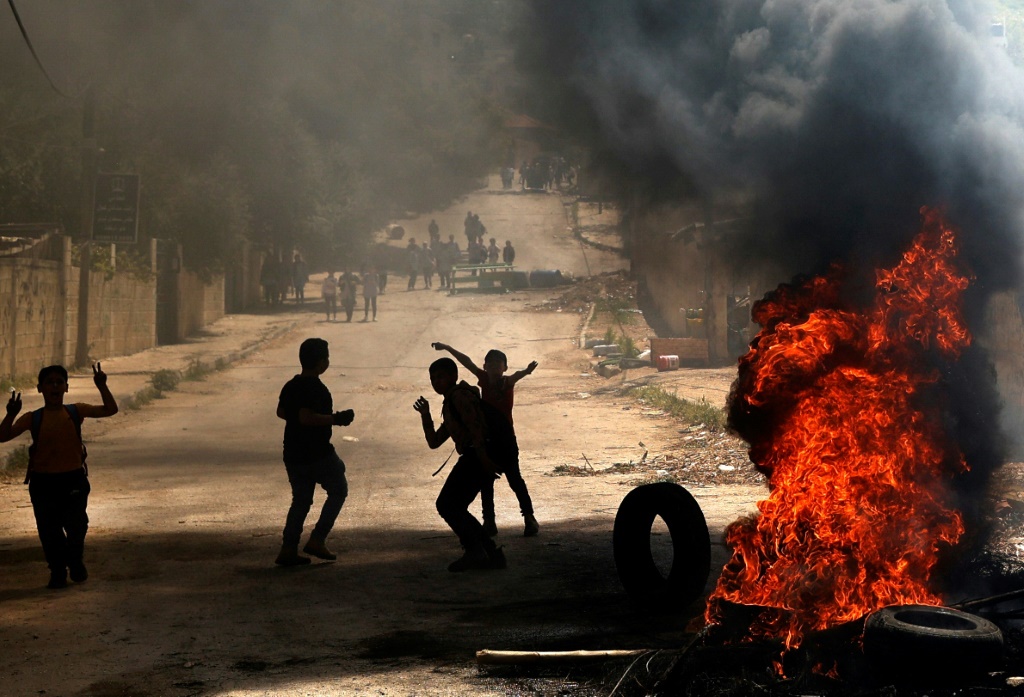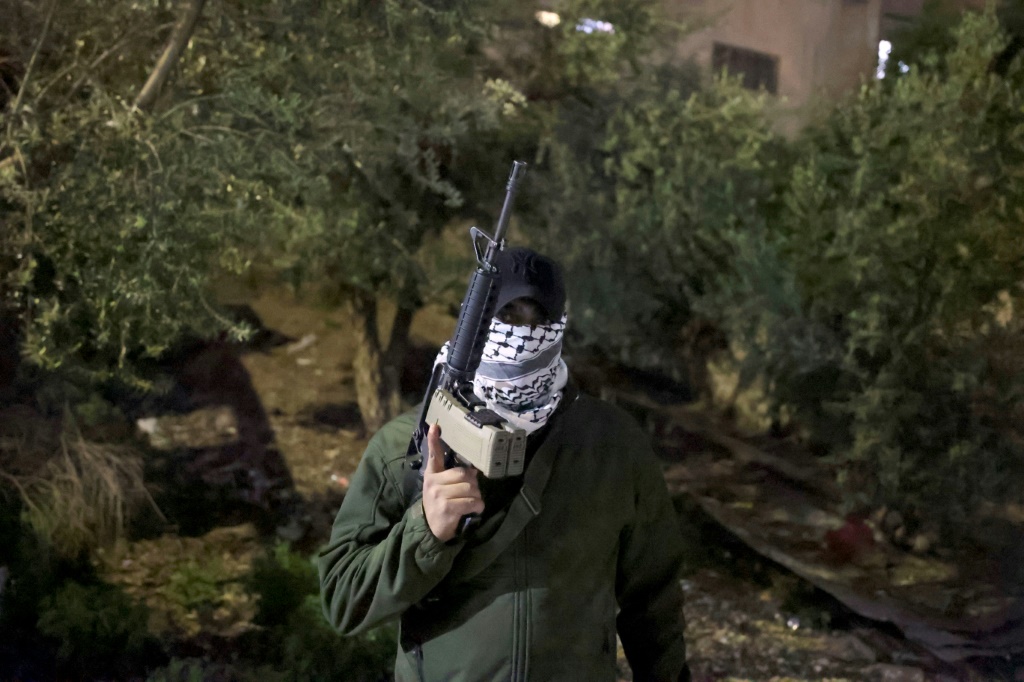

Israeli troops clash with Palestinians in Nablus after entering the West Bank city with Jewish builders to carry out repairs at a flashpoint religious site (AFP/-)

The brother of Palestinian lawyer Muhammad Hassan Muhammad Assaf mourns over his body during the funeral in the village of Kafr Laqif near Qalqilya in the northwest of the occupied West Bank

Israel has poured in additional forces and is reinforcing its wall and fence barrier with the occupied territory after four deadly attacks have claimed 14 lives in Israel, most of them civilians, in the past three weeks (AFP/JACK GUEZ)
Jaafar Ashtiyeh with Daniella Cheslow in Tel Aviv
Wed, April 13, 2022
A Palestinian lawyer was killed Wednesday, the fifth day of Israeli raids in the West Bank following deadly attacks in the Jewish state, amid heightened tensions after a flashpoint religious site was vandalised.
Israel has poured in additional forces and is reinforcing its wall and fence barrier with the occupied territory after four deadly attacks have claimed 14 lives in Israel, most of them civilians, in the past three weeks.
Violent clashes erupted in the West Bank city of Nablus where Israeli forces were escorting a work crew that came to repair Joseph's Tomb, which is sacred to Jews and which was smashed in an act of vandalism last weekend.
Israeli troops racing through the city's streets in an armoured convoy opened fire as a crowd pelted them with rocks and incendiary devices.
"Hundreds of Palestinians instigated a violent riot, burned tyres and hurled rocks and Molotov cocktails at the soldiers" who responded with "riot dispersal means and live ammunition," the army said.
The Palestinian health ministry said human rights lawyer Muhammad Hassan Muhammad Assaf, 34, "died after being shot in the chest by the Israeli occupation army during the aggression on the city of Nablus".
The Israeli army did not confirm its forces had shot the lawyer, whose death brought to 16 the number of Palestinian fatalities in the ongoing escalation.
- 'On the offensive' -
Witnesses told AFP Assaf was standing by the roadside, having just taken his nephews to school, when he was hit by a bullet as Israeli forces fired while pulling out of Nablus.
Assaf was mourned as a "fierce defender of his people" by his employer, the Colonisation and Wall Resistance Commission of the Ramallah-based Palestinian Authority.
Palestinian prime minister Mohammad Shtayyeh charged that Israeli soldiers "murder for the sake of murder, with a license granted by the prime minister of the occupying state, Naftali Bennett, without the slightest regard for international law".
Bennett has warned that Israel is now "on the offensive" and determined to arrest militant suspects.
The latest major attack Israel suffered was a shooting rampage last Thursday in Tel Aviv that claimed three lives and wounded over a dozen more. The gunman, from Jenin, died in a shootout with Israeli forces following an all-night manhunt.
The Israeli army said Wednesday it also carried out "counterterrorist operations" in the Palestinian militant bastion of Jenin and other West Bank cities.
In the city of Tulkarem, Israeli border police said they shot and wounded "a suspect in terrorist activity" who fled special forces trying to arrest him.
Violence flared near Joseph's Tomb as Israeli forces escorted the Jewish settler construction crew sent in to repair the damaged site.
- 'Restore the honour' -
Bennett had vowed on Sunday that "we will not abide such an assault on a place that is holy to us -- on the eve of Passover", the Jewish festival.
The operation's commander could be heard in a video telling his soldiers that "we get to restore the honour to this land and the people of Israel", and that they would enter the site "as sons of kings".
The Palestinian Red Crescent reported 31 people wounded around the Nablus site and a nearby village, including 10 hit by live rounds.
The holy site, where Jews say the Biblical patriarch Joseph is buried, is a frequent flashpoint between Israelis and Palestinians. It was partially destroyed in 2000 during a Palestinian uprising and also torched in 2015.
Palestinian authorities consider the wider site an Islamic archaeological monument where a revered cleric was buried two centuries ago.
The clashes have come during the Muslim holy month of Ramadan and ahead of the start of Passover Friday, an overlap that can heighten tensions around sacred sites in Jerusalem's Old City.
Last year Hamas, the Islamist group that runs the Gaza Strip, fired rockets toward Jerusalem following disturbances at the Al-Aqsa Mosque, the third holiest site in Islam, setting off a devastating 11-day war.
dac/jjm/fz/lg















